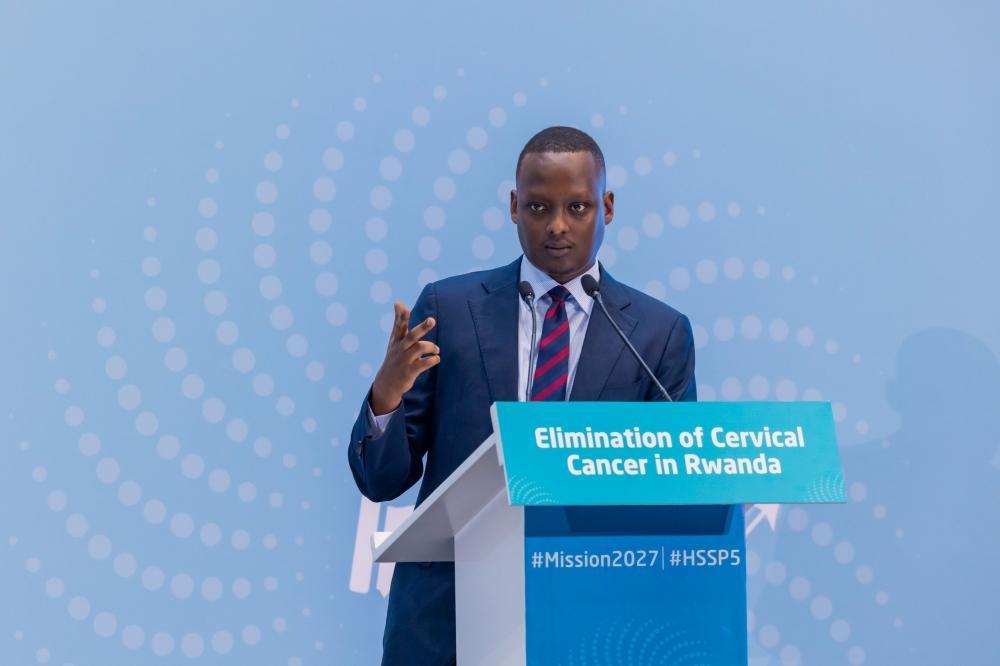Africa-Press – Rwanda. Effective healthcare in the first days of a child’s life, emergency medical services for patients, and complex care such as in the case of cancer and complicated surgeries, should be given priority going forward to save lives, the Minister of State for Health, Dr. Yvan Butera, has said.
He made the observation on Friday, January 31, as Rwanda launched the fifth Health Sector Strategic Plan (HSSP V) (2024/25–2028/29), a comprehensive blueprint to advance progress toward universal health coverage by 2030.
The strategy builds on the achievements of HSSP IV (2019–2024), strengthening Rwanda’s healthcare system for the future, according to the Ministry of Health.
Butera said that the fourth strategic plan that has just been completed significantly expanded the quality of care.
Achievements that were made, he said, include that “close to 95 per cent of babies are now delivered in health facilities with the skilled birth attendance.
Data from the Ministry of Health shows that maternal mortality in Rwanda dropped by half, from 210 to 105 deaths per 100,000 live births between 2014-15 and 2023, making the country one of the top performers in addressing the issue in Sub-Saharan Africa.
Also, in the same period, neonatal mortality declined from 10.7 to 5.45 per 1,000 live births, which implies it was almost halved.
The country, however, still faces a lot of challenges, he said. He pointed out that chronic malnutrition and stunting is still a big issue, as well as under five mortality which is at 45 per 1,000 births.
Preventable deaths also still occur, he said, “and it should be our commitment here today that we shouldn’t face any death which we can prevent.”
He appreciated the country’s gains in life expectancy [at birth], which went up from 46 years in 1978 to 69.6 in 2022, as per data from the Rwanda Population and Housing Census of 2022 by the National Institute of Statistics of Rwanda.
Again, he said, the country can raise life expectancy further, outlining key actions that need to be done to prevent early death, mostly on the neonatal part and the first year of life.
“I think we need to come up with an approach where we track every birth that we have in the country and ensure that we have the best outcomes,” he said.
“When we lose kids very early, it has a big impact on our life expectancy,” he said, adding that mothers also play a big role in that [and so, protecting their lives is critical.]
Butera underscored the importance of concentrating on the early days of life – such as ensuring a child’s safety for the first year from birth – “because after that, largely thanks to vaccination, we have crossed the safe space.”
The second zone where we still lose a lot of patients, he said, is in emergency situation, during the period he described as the golden hours [the first hours after a serious medical event or injury during which treatment to prevent irreversible internal damage and optimise the chance of survival, is likely to be the most effective].
“We need to equip our health facilities with standard emergency services,” he said, citing road traffic accidents, acute cardiac events, among other emergencies.
Emergency services are expected to be expanded for all Rwandans so that they cross the golden hours very well, he pointed out.
The third layer where we are still struggling is complex multidisciplinary care, Butera said.
“It’s taking shape, it was mostly the issue of workforce, but with the launch of our fellowships in different subspecialties, we think we are going to do well, mostly in complicated surgeries, in cancer management, and other diseases,” he observed.
For More News And Analysis About Rwanda Follow Africa-Press






